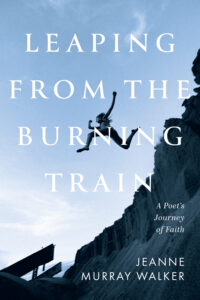 Leaping from the Burning Train
Leaping from the Burning TrainAn ode to reading and writing, lurking inside an account of questing faith—or perhaps the other way around. Why read spiritually-minded prose by a poet? Because the poet tells us that Alice Munro’s short stories have been, for her, a means of grace. Because she tells us that reading is a sacrament. That we might “quarry our own lives for images instead of buying. . .ready-made ones.” I feel lucky to be Jeanne Murray Walker’s friend. I feel even luckier to be her reader.
—Lauren Winner, author of The Dangers of Christian Practice
Nowadays, when dark, Dickensian memoirs about growing up in fundamentalism abound, Jeanne Murray Walker’s loving look backward at the community that raised her is both enthralling and inspiring. She manages to honor those she refers to as “my people,” while offering up—sometimes sorrowfully, sometimes hilariously, but always in gorgeous and incisive detail—the actual facts of the matter. I am grateful for this achingly beautiful book.
—Paula Huston, author of A Land Without Sin and The Hermits of Big Sur
Jeanne Murray Walker’s poetic insights and her detailed, dynamic, and often self-revelatory prose, show us as a writer we need to know and honor. This memoir is more than a chronicle of an entrance into a life of poetry; it is a significant addition to the literature of spirituality.
—Luci Shaw, author of Reversing Entropy and An Incremental Life
 Pilgrim, You Find the Path by Walking
Pilgrim, You Find the Path by WalkingJeanne Murray Walker’s wondrous new collection attests to the enduring value and relevance of poetic form. This is poetry we need today, this is poetry for always. —Sofia Starnes, past poet laureate of Virginia
Walker proves that the sonnet form can provoke new levels of meaning, enrich language usually unheard, and uncover images invisible to the casual viewer. We find a universe of colors we have never imagined and questions we have hardly dared to ask.” —Jill Baumgaertner, poetry editor for The Christian Century
“There is a rock-solid belief in the mystery of beauty in these poems, and in the perpetual creation of a God always creating; and there is an equally foundational belief in form and how the sonnet form itself can give rise to a seemingly infinite variety of permutations. —Robert Cording, poet and author of Only So Far: Poems
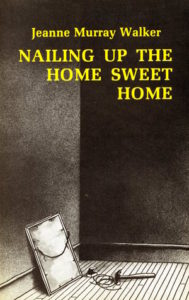 Nailing Up the Home Sweet Home
Nailing Up the Home Sweet Home“What a splendid first book! Jeanne Murray Walker’s poems ring true and wild as currents of wind inside a storm cloud. They never fail in their allegiance to the life of complex feelings inside her and inside us.”
—Richard Hugo
“Walker does not employ comfortably plain speech but something trickier, something more nearly the music of verse, though it has a certain tartness that keeps you off balance, harpsichord rather than piano. This book has the compulsiveness of fiction which makes us want to turn the page, for which we submit ourselves to the rise and fall of the largest emotional rhythms.”
—Dave Smith, The American Poetry Review
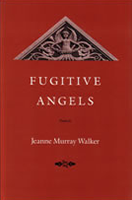 Fugitive Angels: Poems
Fugitive Angels: Poems“Fugitive Angels cunningly recalls, like a mother reminding children it is time to eat, the creeds by which we pretend we live. These creeds are set against more acceptable fictions, and more acceptable rationalism. The fine line between the two is the space in which Walker locates her work. These poems fit. They bend and flex. They are funny, punning, and clear-headed.”
—Peggy Phelan, The Women’s Review of Books
“Jeanne Murray Walker’s second book is long, substantial, energetic. She is both story-teller and metaphysician. The best of these poems have the plain radiance of Walker Evans photographs.”
—Jane Cooper, Washington Post Book World
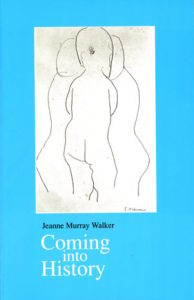 Coming Into History
Coming Into History“What an exhilarating book this is, full of passions and wit. Any reader who thinks nothing more can be said about birth and a child’s new life has a stunning surprise coming. Jeanne Murray Walker’s poems connect us with our past and our future; they shower us with the riches of the world.”
—Lisel Mueller
“With Coming into History Jeanne Murray Walker takes her place among the best poets of her generation. Her fecund and generous imagination embraces the commonplace and the bizarre with empathy and dramatic power.”
–-Daniel Hoffman
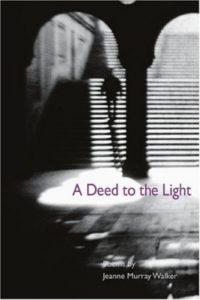 A Deed to the Light
A Deed to the Light“She has the timing and wit of a great comedian and the intense, quirky symbolism of a prophet.”
— Image Update
“Underlying the overall intensity of the collection are . . .the startling juxtapositions of images and sudden metaphors. . . . But she never loses the familiar touch, the honest voice.”
— The Midwest Quarterly
“Her great genius is her use of metaphors. . . Toward the end of the book, the poems seem to step out of their narrative constraints, as interesting as their stories are, and become pure metaphor.”
— Thom Satterlee, Christianity and Literature
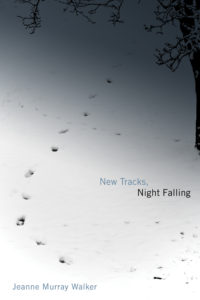 New Tracks, Night Falling
New Tracks, Night Falling“Jeanne Murray Walker leaves her readers with the feeling of enormous power held in reserve only by the true instincts of a superb artist. This is her finest book.”
— Rod Jellema
“Yes, night falls in these poems. But we’re in the company of a bold woman with a stout flashlight who . . . reveals a path through the woods that is as brilliant in the dark as it is in the light. I think I would follow Jeanne Murray Walker anywhere.”
— Leslie Leyland Fields
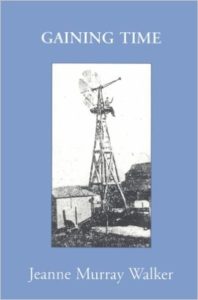 Gaining Time
Gaining Time“This book is funny, subtly erudite, uplifting. . . . It consistently hints at the greater mysteries, both cosmic and theological. . . . Many poems explore. . the problem of accepting the brevity and relativity of one’s destiny as a transient creature situated on the ladder of successive generations. A splendid collection.”
— John Taylor, Poetry
“. . .she flies high—and also low and close when necessary—over her mighty subject, the inventing of America. . . . discovers the fabulous in the daily and the wayward as a way of life.
—Theodore Weiss
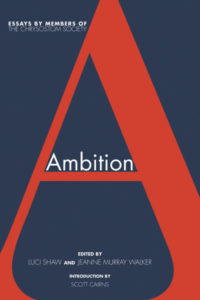 Ambition
AmbitionIn this volume, nine members of the Chrysostom Society of Writers asked themselves what role ambition has played in their lives. Their honest, funny, thoughtful responses range from Diane Glancy’s praise of ambition as a gift to Eugene Peterson’s caution that busyness can be crippling. Erin McGraw argues that the extent to which ambition is good or bad depends upon the goal—the what for which one is ambitious. Jeanne Murray Walker wrestles with the gender-specific challenges of a woman with ambitions and Gina Ochsner offers an entertaining appraisal of ambition’s insatiability. Other contributors include Bret Lott, Luci Shaw, Dain Trafton, and Emily Griffin.
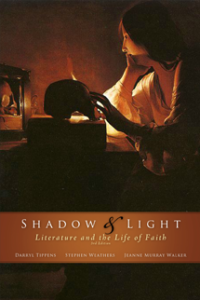 Shadow and Light: Literature and the Life of Faith
Shadow and Light: Literature and the Life of Faith“Shadow & Light is remarkable for the rich variety of its selections. Spanning a range of literature from medieval religious lyrics to contemporary American poetry, from John Bunyan to Isaac Bashevis Singer and John Updike, it makes vividly clear that the exploration of spiritual values is not limited to believers of one faith, or, indeed, not even to believers.”
—Robert Alter
 The Geography of Memory
The Geography of Memory“What powerfully winds through the narrative is a poet’s wonderful reflections on her own history and the nature of memory, identity, and the self.”
–Myrna Grant
“The Geography of Memory is, hands down, one of the most beautiful books I’ve ever read.”
–Paula Huston
“. . . it’s full of joy as well as sorrow. What a gift she has given us.”
–John Wilson
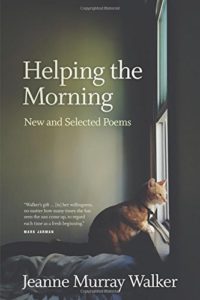 Helping the Morning: New and Selected Poems
Helping the Morning: New and Selected Poems“I marvel at the wholeness of Walker’s vision, and how it pits the illumination of insight against the mystery of eternity.”
—Elaine Terranova
“Many of the poems in Helping the Morning display a quality that can fairly be called sacramental. Jeanne Murray Walker is a major poet.”
–Frank Wilson, Philadelphia Inquirer Book Review
